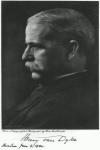A SEAMAN'S TALE OF THE SEA
We men hat go down for a livin' in ships to the sea,
We love it a different way from you poets that 'bide on the land.
We are fond of it, sure! But, you take it as comin' from me,
There's a fear and a hate in our love that a landsman can't understand.
Oh, who could help likin' the salty smell, and the blue
Of the waves that are lazily breathin' as if they dreamed in the sun?
She's a Sleepin' Beauty, the sea,but you can't tell what she'll do;
And the seamen never trust her,they know too well what she's done!
She's a wench like one that I saw in a singin'-play,
Carmen they called her,Lord, what a life her lovers did lead!
She'd cuddle and kiss you, and sing you and dance you away;
And then,she'd curse you, and break you, and throw you down like a weed.
You may chance it awhile with the girls like that, if you please;
But you want a woman to trust when you settle down with a wife;
And a seaman's thought of growin' old at his ease
Is a snug little house on the land to shelter the rest of his life.
So that was old Poisson's dream,did you know the Cap'?
A brown little Frenchman, clever, and brave, and quick as a fish,
Had a wife and kids on the other side of the map,
And a rose-covered cottage for them and him was his darlin' wish.
I 'ave sail, says he, in his broken-up Frenchy talk,
Mos' forty-two year; I 'ave go on all part of de worl' dat ees wet.
I'm seeck of de boat and de water. I rader walk
Wid ma Josephine in one garden; an' eef we get tire', we set!
You see dat bateau, Sainte Brigitte? I bring 'er dh'are
From de Breton coas', by gar, jus' feefteen year bifore.
She ole w'en she come on Kebec, but Holloway Frères
Dey buy 'er, an' hire me run 'er along dat dam' Nort' Shore.
Dose engine one leetl' bit cranky,too ole, you see,
She roll and peetch in de wave'. But I lak' 'er pretty well;
An' dat sheep she lak' 'er captaine, sure, dat's me!
Wit' forty ton coal in de bunker, I tek' dat sheep t'rou' hell.
But I don' wan' risk it no more; I had bonne chance:
I save already ten t'ousan' dollar', dat's plenty I s'pose!
Nex' winter I buy dat house wid de garden on France
An' I tell adieu to de sea, and I leev' on de lan' in ripose.
All summer he talked of his house,you could see the flowers
Abloom, and the pear-trees trained on the garden-wall so trim,
And the Captain awalkin' and smokin' away the hours,
He thought he had done with the sea, but the sea hadn't done with him!
It was late in the fall when he made the last regular run,
Clear down to the Esquimault Point and back with his rickety ship;
She hammered and pounded a lot, for the storms had begun;
But he drove her,and went for his season's pay at the end of the trip.
Now the Holloway Brothers are greedy and thin little men,
With their eyes set close together, and money's their only God;
So they told the Cap' he must run the Bridget again,
To fetch a cargo from Moisie, two thousand quintals of cod.
He said the season was over. They said: Not yet.
You finish the whole of your job, old man, or you don't draw a cent!
(They had the Bridget insured for all they could get.)
And the Captain objected, and cursed, and cried. But he went.
They took on the cargo at Moisie, and folks beside,
Three traders, a priest, and a couple of nuns, and a girl
For a school at Quebec,when the Captain saw her he sighed,
And said: Ma littl' Fifi got hair lak' dat, all curl!
The snow had fallen a foot, and the wind was high,
When the Bridget butted her way thro' the billows on Moisie bar.
The darkness grew with the gale, not a star in the sky,
And the Captain swore: We mus' make Sept Isles to-night, by gar!
He couldn't go back, for he didn't dare to turn;
The sea would have thrown the ship like a mustang noosed with a rope;
For the monstrous waves were leapin' high astern,
And the shelter of Seven Island Bay was the only hope.
There's a bunch of broken hills half sunk in the mouth
Of the bay, with their jagged peaks afoam; and the Captain thought
He could pass to the north; but the sea kept shovin' him south,
With her harlot hands, in the snow-blind murk, till she had him caught.
She had waited forty years for a night like this,
Did he think he could leave her now, and live in a cottage, the fool?
She headed him straight for the island he couldn't miss;
And heaved his boat in the dark,and smashed it against Gran' Boule.
How the Captain and half of the people clambered ashore,
Through the surf and the snow in the gloom of that horrible night,
There's no one ever will know. For two days more
The death-white shroud of the tempest covered the island from sight.
How they suffered, and struggled, and died, will never be told;
We discovered them all at last when we reached Gran' Boule with a boat;
The drowned and the frozen were lyin' stiff and cold,
And the poor little girl with the curls was wrapped in the Captain's coat.
Go write your song of the sea as the landsmen do,
And call her your great sweet mother, your bride, and all the rest;
She was made to be loved,but remember, she won't love you,
The men who trust her the least are the sailors who know her the best.






